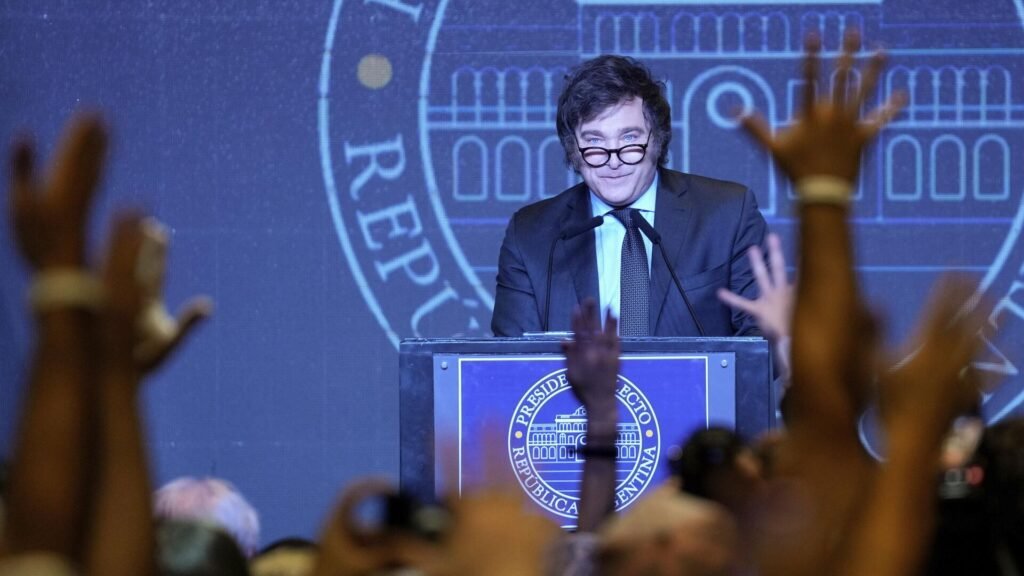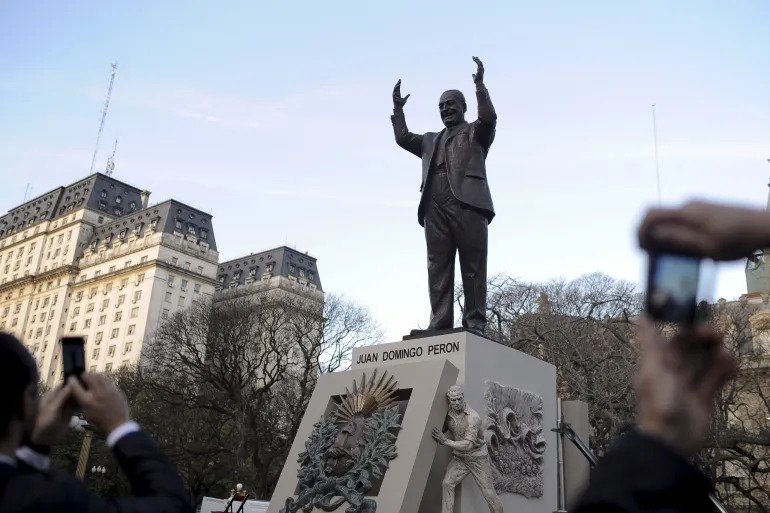Argentina experienced a significant political shift with the outcome of the open simultaneous and mandatory primaries (PASO). The most remarkable result was the rise of Javier Milei, an outsider in traditional politics and a far-right libertarian candidate, who emerged as the frontrunner with 30% of the vote. This primary election set the tone for the official presidential election scheduled for October 22, 2023, revealing a country deeply divided and uncertain about its political future.

The Rise of Javier Milei
Milei’s unexpected victory demonstrated the growing appeal of radical change amid Argentina’s ongoing economic crises, with inflation surpassing 100% annually and widespread dissatisfaction with the status quo. Milei’s platform, built on promises of economic liberalization and extreme libertarian reforms, resonated with an electorate desperate for solutions. His proposal to dollarize the economy, reminiscent of neoliberal policies from the 1990s, and his anti-establishment rhetoric gained traction, particularly in traditionally Peronist strongholds. His ideas, however controversial, captured the frustration of a populace worn down by persistent inflation and political gridlock.
Milei’s success highlighted the disillusionment with Argentina’s traditional political elites, as he positioned himself as the candidate willing to dismantle the old political system—referred to as the “caste”—and implement radical reforms. His libertarianism, influenced by U.S. economist Murray Rothbard’s anarcho-capitalism, includes the extreme notion of privatizing public services and even permitting the sale of organs. Though many voters do not endorse these extreme ideas, Milei’s anti-establishment appeal resonated with those seeking a dramatic break from the past.
The Conservative Opposition: A Fragmented Front
The liberal-conservative coalition Juntos por el Cambio (JxC) came in second with 28% of the vote. This outcome reflected a shift within the conservative bloc itself, as former security minister Patricia Bullrich defeated Buenos Aires Mayor Horacio Rodríguez Larreta. Bullrich, known for her hardline stance on crime and social protest, capitalized on a growing desire for a “strong hand” approach to governance, with a focus on law and order. Her victory over the more moderate Rodríguez Larreta underscored the dominance of right-wing populism within the conservative movement.
Bullrich’s success in the primaries positioned her as a serious contender for the presidency, though she faces the challenge of navigating a fractured right-wing landscape, particularly in the face of Milei’s insurgent campaign. Her hardline approach, while resonating with some, may alienate more moderate voters seeking pragmatic solutions to Argentina’s deep-seated economic problems.
Peronism in Decline
For the first time in Argentine history, Peronism, represented by the coalition Unión por la Patria, came in third with 27% of the vote. This result signals a dramatic weakening of the political force that has dominated Argentine politics for decades. The Peronist candidate, current Economy Minister Sergio Massa, was viewed as a pragmatic centrist, backed by influential figures like former president Cristina Fernández de Kirchner. However, Massa’s candidacy faced resistance from a significant portion of the Peronist base, particularly those aligned with left-wing populist Juan Grabois, who drew support from more ideologically purist Kirchnerists.
Massa’s role as the government’s face in an era of economic turmoil hampered his appeal, as many voters saw him as part of the problem rather than the solution. The Peronist vote was further fragmented by internal disagreements, and the party’s once-strong base in the Buenos Aires metropolitan area showed signs of disillusionment, weakening its traditional hold on working-class voters.

The Broader Implications
The results of the PASO elections indicate a major realignment in Argentine politics. The combined vote for Milei and Bullrich suggests that right-wing and far-right candidates now command nearly half of the electorate. This shift toward more extreme political positions reflects not only economic desperation but also a broader sense of frustration with the political system.
Milei’s ability to connect with working-class and lower-middle-class voters, particularly in provinces where Peronism once reigned, is a striking departure from traditional Argentine political dynamics. His success in these areas reveals a growing disillusionment with the Peronist promise of state-led social protection. Instead, Milei’s appeal to personal freedom and anti-statism has resonated with voters who feel abandoned by the traditional welfare state.
Argentina’s Path Forward
As the October 22 election approaches, Argentina faces a moment of profound uncertainty. The political landscape has shifted dramatically, with the far-right gaining ground while Peronism struggles to maintain relevance. Milei’s radical proposals, such as dollarization and dismantling the state, may appeal to those desperate for change, but they also carry significant risks for Argentina’s fragile economy. Bullrich, meanwhile, will need to balance her tough-on-crime rhetoric with a strategy that appeals to moderates if she hopes to consolidate conservative support.
For Peronism, the challenge lies in rebuilding its base and finding a message that resonates with voters beyond the core Kirchnerist factions. The once-dominant political force is now at a crossroads, with its traditional alliances fractured and its future uncertain.
Argentina’s 2023 primary election marks a turning point in its political history. The rise of Javier Milei and the weakening of Peronism signal a country in search of new answers to old problems. With the official election on the horizon, Argentina’s political future remains deeply uncertain. What is clear, however, is that the status quo has been rejected, and the country is poised for a major transformation—whether through Milei’s radical libertarianism, Bullrich’s hardline conservatism, or a last-minute resurgence of Peronism remains to be seen.

